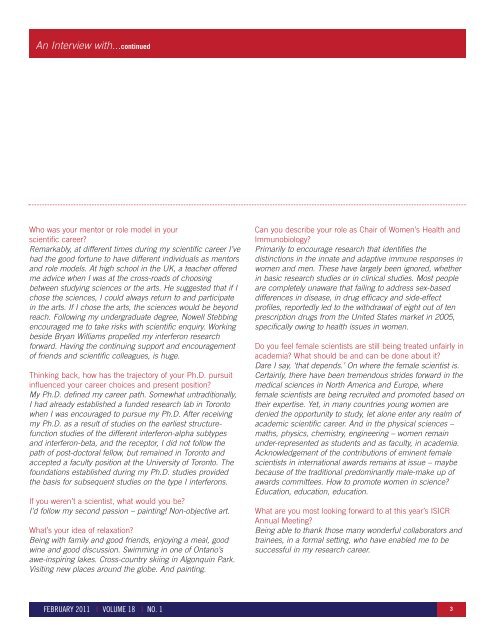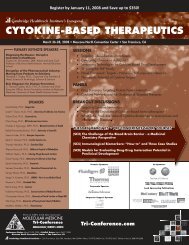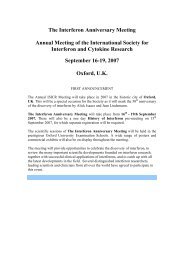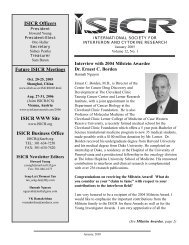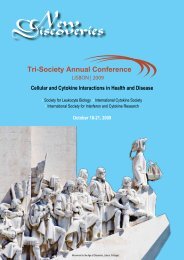9th Joint Meeting ISICR-ICS Cytokines & Interferons: From the ...
9th Joint Meeting ISICR-ICS Cytokines & Interferons: From the ...
9th Joint Meeting ISICR-ICS Cytokines & Interferons: From the ...
You also want an ePaper? Increase the reach of your titles
YUMPU automatically turns print PDFs into web optimized ePapers that Google loves.
An Interview with...continued<br />
Who was your mentor or role model in your<br />
scientific career?<br />
Remarkably, at different times during my scientific career I’ve<br />
had <strong>the</strong> good fortune to have different individuals as mentors<br />
and role models. At high school in <strong>the</strong> UK, a teacher offered<br />
me advice when I was at <strong>the</strong> cross-roads of choosing<br />
between studying sciences or <strong>the</strong> arts. He suggested that if I<br />
chose <strong>the</strong> sciences, I could always return to and participate<br />
in <strong>the</strong> arts. If I chose <strong>the</strong> arts, <strong>the</strong> sciences would be beyond<br />
reach. Following my undergraduate degree, Nowell Stebbing<br />
encouraged me to take risks with scientific enquiry. Working<br />
beside Bryan Williams propelled my interferon research<br />
forward. Having <strong>the</strong> continuing support and encouragement<br />
of friends and scientific colleagues, is huge.<br />
Thinking back, how has <strong>the</strong> trajectory of your Ph.D. pursuit<br />
influenced your career choices and present position?<br />
My Ph.D. defined my career path. Somewhat untraditionally,<br />
I had already established a funded research lab in Toronto<br />
when I was encouraged to pursue my Ph.D. After receiving<br />
my Ph.D. as a result of studies on <strong>the</strong> earliest structurefunction<br />
studies of <strong>the</strong> different interferon-alpha subtypes<br />
and interferon-beta, and <strong>the</strong> receptor, I did not follow <strong>the</strong><br />
path of post-doctoral fellow, but remained in Toronto and<br />
accepted a faculty position at <strong>the</strong> University of Toronto. The<br />
foundations established during my Ph.D. studies provided<br />
<strong>the</strong> basis for subsequent studies on <strong>the</strong> type I interferons.<br />
If you weren’t a scientist, what would you be?<br />
I’d follow my second passion – painting! Non-objective art.<br />
What’s your idea of relaxation?<br />
Being with family and good friends, enjoying a meal, good<br />
wine and good discussion. Swimming in one of Ontario’s<br />
awe-inspiring lakes. Cross-country skiing in Algonquin Park.<br />
Visiting new places around <strong>the</strong> globe. And painting.<br />
Can you describe your role as Chair of Women’s Health and<br />
Immunobiology?<br />
Primarily to encourage research that identifies <strong>the</strong><br />
distinctions in <strong>the</strong> innate and adaptive immune responses in<br />
women and men. These have largely been ignored, whe<strong>the</strong>r<br />
in basic research studies or in clinical studies. Most people<br />
are completely unaware that failing to address sex-based<br />
differences in disease, in drug efficacy and side-effect<br />
profiles, reportedly led to <strong>the</strong> withdrawal of eight out of ten<br />
prescription drugs from <strong>the</strong> United States market in 2005,<br />
specifically owing to health issues in women.<br />
Do you feel female scientists are still being treated unfairly in<br />
academia? What should be and can be done about it?<br />
Dare I say, ‘that depends.’ On where <strong>the</strong> female scientist is.<br />
Certainly, <strong>the</strong>re have been tremendous strides forward in <strong>the</strong><br />
medical sciences in North America and Europe, where<br />
female scientists are being recruited and promoted based on<br />
<strong>the</strong>ir expertise. Yet, in many countries young women are<br />
denied <strong>the</strong> opportunity to study, let alone enter any realm of<br />
academic scientific career. And in <strong>the</strong> physical sciences –<br />
maths, physics, chemistry, engineering – women remain<br />
under-represented as students and as faculty, in academia.<br />
Acknowledgement of <strong>the</strong> contributions of eminent female<br />
scientists in international awards remains at issue – maybe<br />
because of <strong>the</strong> traditional predominantly male-make up of<br />
awards committees. How to promote women in science?<br />
Education, education, education.<br />
What are you most looking forward to at this year’s <strong>ISICR</strong><br />
Annual <strong>Meeting</strong>?<br />
Being able to thank those many wonderful collaborators and<br />
trainees, in a formal setting, who have enabled me to be<br />
successful in my research career.<br />
FEBRUARY 2011 I VOLUME 18 I NO. 1 3


